
Malcolm Frederick Evans was an English road manager and personal assistant employed by the Beatles from 1963 until their break-up in 1970.
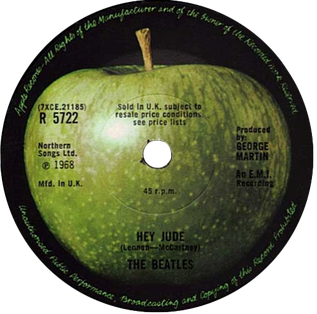
"Hey Jude" is a song by the English rock band the Beatles that was released as a non-album single in August 1968. It was written by Paul McCartney and credited to the Lennon–McCartney partnership. The single was the Beatles' first release on their Apple record label and one of the "First Four" singles by Apple's roster of artists, marking the label's public launch. "Hey Jude" was a number-one hit in many countries around the world and became the year's top-selling single in the UK, the US, Australia and Canada. Its nine-week run at number one on the Billboard Hot 100 tied the all-time record in 1968 for the longest run at the top of the US charts, a record it held for nine years. It has sold approximately eight million copies and is frequently included on music critics' lists of the greatest songs of all time.
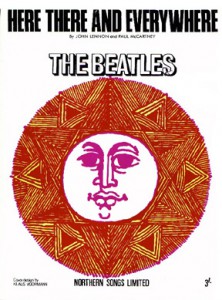
"Here, There and Everywhere" is a song by the English rock band the Beatles from their 1966 album Revolver. A love ballad, it was written by Paul McCartney and credited to Lennon–McCartney. McCartney includes it among his personal favourites of the songs he has written. In 2000, Mojo ranked it 4th in the magazine's list of the greatest songs of all time.

"The Long and Winding Road" is a song by the English rock band the Beatles from their 1970 album Let It Be. It was written by Paul McCartney and credited to Lennon–McCartney. When issued as a single in May 1970, a month after the Beatles' break-up, it became the group's 20th and final number-one hit on the Billboard Hot 100 chart in the United States.

"Helter Skelter" is a song by the English rock band the Beatles from their 1968 album The Beatles. It was written by Paul McCartney and credited to Lennon–McCartney. The song was McCartney's attempt to create a sound as loud and dirty as possible. It is regarded as a key influence in the early development of heavy metal. In 1976, the song was released as the B-side of "Got to Get You into My Life" in the United States, to promote the Capitol Records compilation Rock 'n' Roll Music.

"And Your Bird Can Sing" is a song by the English rock band the Beatles. It was released on their 1966 album Revolver, apart from in the United States and Canada, where it instead appeared on Yesterday and Today. The song was written mainly by John Lennon and credited to Lennon–McCartney. The recording features an extended dual-guitar melody, played by George Harrison and Paul McCartney, which anticipated the harmonised guitar arrangements commonly used by Southern rock, hard rock and heavy metal bands.
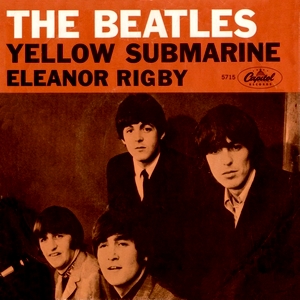
"Eleanor Rigby" is a song by the English rock band the Beatles from their 1966 album Revolver. It was also issued on a double A-side single, paired with "Yellow Submarine". Credited to the Lennon–McCartney songwriting partnership, the song is one of only a few in which John Lennon and Paul McCartney later disputed primary authorship. Eyewitness testimony from several independent sources, including George Martin and Pete Shotton, supports McCartney's claim to authorship.

"Come Together" is a song by the British rock band the Beatles, written by John Lennon and credited to Lennon–McCartney. The song is the opening track on the band's 1969 album Abbey Road. It was also a double A-side single in the United Kingdom with "Something", reaching No. 4 in the UK charts.

"Blackbird" is a song by the English rock band the Beatles from their 1968 double album The Beatles. It was written by Paul McCartney and credited to Lennon–McCartney, and performed as a solo piece by McCartney. When discussing the song, McCartney has said that the lyrics were inspired by hearing the call of a blackbird in Rishikesh, India, and by the civil rights movement in the Southern United States.

"The Ballad of John and Yoko" is a song by the English rock band the Beatles that was released as a non-album single in May 1969, with "Old Brown Shoe" as its B-side. It was written by John Lennon and credited to the Lennon–McCartney partnership, and chronicles the events surrounding the wedding of Lennon and Yoko Ono. The song was the Beatles' 17th UK number-one single and their last for 54 years until "Now and Then" in 2023. In the United States, it was banned by some radio stations due to the lyrics' reference to Christ and crucifixion. The single peaked at number 8 on the US Billboard Hot 100. The song, along with its B-side, has subsequently appeared on compilation albums such as Hey Jude, 1967–1970, and Past Masters. It was also included on the compilation 1.

"Dear Prudence" is a song by the English rock band the Beatles from their 1968 double album The Beatles. The song was written by John Lennon and credited to the Lennon–McCartney partnership. Written in Rishikesh during the group's trip to India in early 1968, it was inspired by actress Mia Farrow's sister, Prudence Farrow, who became obsessive about meditating while practising with Maharishi Mahesh Yogi. Her designated partners on the meditation course, Lennon and George Harrison, attempted to coax Farrow out of her seclusion, which led to Lennon writing the song.

"Sgt. Pepper's Lonely Hearts Club Band" is a song by the English rock band the Beatles, written by Paul McCartney, credited to Lennon–McCartney, and released in 1967 on the album of the same name. The song appears twice on the album: as the opening track, and as "Sgt. Pepper's Lonely Hearts Club Band (Reprise)", the penultimate track. As the title song, the lyrics introduce the fictional band that performs on the album.

"The Night Before" is a song by the English rock band the Beatles from their 1965 film Help! and soundtrack album of the same name. It was written primarily by Paul McCartney and credited to the Lennon–McCartney partnership. Described as a pop rock or rock and roll song, its lyrics reflect on the singer's last night with his lover before being abandoned.

"Tell Me What You See" is a song by the English rock band the Beatles that first appeared in 1965 on their album Help! in the United Kingdom and on Beatles VI in the United States. The song is credited to Lennon–McCartney but mainly written by Paul McCartney. Regarding the song's authorship, McCartney said, "I seem to remember it as mine. I would claim it as a 60–40 but it might have been totally me." John Lennon said, in his interviews with Playboy (1980) and Hit Parader (1972), that "Tell Me What You See" was written completely by McCartney.
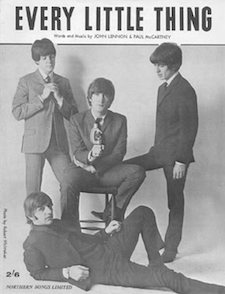
"Every Little Thing" is a song by the English rock band the Beatles from their album Beatles for Sale, issued in the UK in December 1964. Credited to Lennon–McCartney, it was written by Paul McCartney. Capitol Records first issued the song in the US on Beatles VI in June 1965. The track is an early example of the Beatles' use of non-rock instrumentation on a recording, through the addition of timpani drum over the choruses.
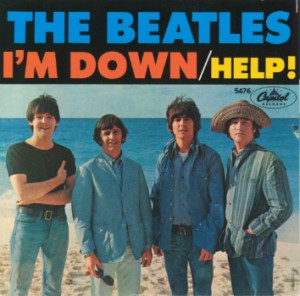
"I'm Down" is a song by the English rock band the Beatles, written by Paul McCartney and credited to Lennon–McCartney. It was released on a non-album single as the B-side to "Help!" in July 1965. The song originated in McCartney's attempt to write a song in the style of Little Richard, whose song "Long Tall Sally" the band regularly covered.

"Magical Mystery Tour" is a song by the English rock band the Beatles and the title track to the December 1967 television film of the same name. It was released on the band's Magical Mystery Tour soundtrack record, which was a double EP in Britain and most markets but an album in America, where Capitol Records supplemented the new songs with tracks issued on the Beatles' 1967 singles. The song was written primarily by Paul McCartney and credited to the Lennon–McCartney partnership.
"Grow Old with Me" is one of the final songs written by John Lennon. It was first recorded by Lennon as a demo while in Bermuda. A handwritten lyric sheet for the song is dated July 5, 1980 Fairyland Bermuda. The song was first released on the posthumous album Milk and Honey in 1984. It was also rumored to be among the songs planned as a possible reunion single by his former bandmates during the making of The Beatles Anthology.

Kenneth Womack is an American writer, literary critic, public speaker, and music historian, particularly focusing on the cultural influence of the Beatles. He is the author of the bestselling Solid State: The Story of Abbey Road and the End of the Beatles, John Lennon, 1980: The Last Days in the Life, and Living the Beatles Legend: The Untold Story of Mal Evans.
The Beatles' 1965 tour of the United Kingdom was a concert tour that took place between 3 and 12 December 1965, comprising 18 shows at nine venues across England, Scotland and Wales. It coincided with the release of the Beatles' studio album Rubber Soul and their double A-side single "Day Tripper" / "We Can Work It Out", and was the final UK tour undertaken by the band. Weary of Beatlemania, the group conceded to do the tour but refused to also perform a season of Christmas concerts as they had done over the 1963–64 and 1964–65 Christmas seasons.

















